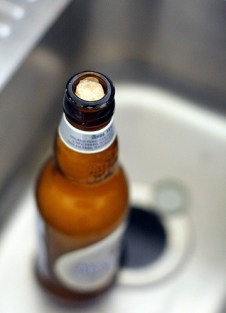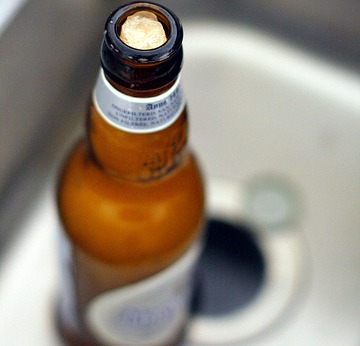Send your question to Umbra!
Q. Dear Umbra,
I have two bottled beers in my refrigerator left over from a party at least three years ago. Incredible, I know, to anyone who loves beer, but I’m not a beer drinker. If this were cake, it would be a different story. Anyway, the question: Is it better to pour the beer down the sink and recycle the bottles, but then I’m adding an alcoholic pollutant to the waterways, or to put the full bottles in the trash. It should be noted that in my community, all trash is burned (in as green a way as possible — my local government is very environmentally conscious).
T.K.
Arlington, Va.

Photo by Nathanael Boehm.
A. Dearest T.K.,
I posed your question to several beer and water-quality experts, all of whom offered this measured, scientific response: “Your letter-writer wants to do what?!”
Let’s just say their concern was not for the aquatic organisms.
Once they got past the horror of imagining any beer meeting such a fate, the expert panelists were relatively unperturbed. “While it is indeed a tragedy that the beer is undrinkable, there is no risk in pouring it down the drain,” said Rick Keil, a professor of chemical oceanography at the University of Washington.
Tracy Collier, an environmental toxicologist who recently retired from NOAA, agreed: “There are a lot of things you should not pour down your drain, things that can harm our waters and the living resources that depend on them, but beer is not one of them.”
Your drain likely empties to a sewage treatment plant or septic field, both of which are well equipped to handle a bit of alcohol now and then, Collier explains. If by some chance your drain leads directly to a waterway, your plan would still be fine, he says. “The organic substances in beer can be pretty quickly utilized as energy sources by microbes and algae, so while you might be causing some nutrient pollution, it’s not likely to have a lasting impact, unless we are talking about a tanker truck full of beer.”
Given that expert advice, I suppose you could feel OK about dumping the beer and recycling the bottles. (As we discovered early in the history of this column, you can also recycle a bottle with a lime wedge in it.) I would certainly choose that route over tossing the full bottles in the trash. We want to recycle whenever possible, especially glass in all its infinite recyclability. Throwing it out, even into your city’s apparently cutting-edge trash-to-energy scheme, is a waste.
But back to the contents of those bottles: Before you head for the sink, you could consider alternative uses for the beer, which can actually substitute for many a toxic household chemical. Here are a few ideas, courtesy of our friends at Care2: attract butterflies, repel slugs, polish copper pots, remove carpet stains, wash your hair, trap fruit flies. Keil of UW points out that some gardeners also swear by beer as a compost additive or, in diluted form, a lawn fertilizer.
Lastly, I have a really radical suggestion: You or someone else could drink the beer. I checked with pros including Matt Simpson, The Beer Sommelier, who told me properly stored beer can remain drinkable for years. (If it’s gone bad, you’ll know immediately.) So perhaps it’s time to throw another party — you could have a water-quality awareness theme! Test your guests to see whether they know that our waterways contain all manner of strange things, like lint from fleece and cinnamon from cookies. Then share some tips for how to prevent water pollution. You’ll be sure to make waves.
Geneseely,
Umbra



